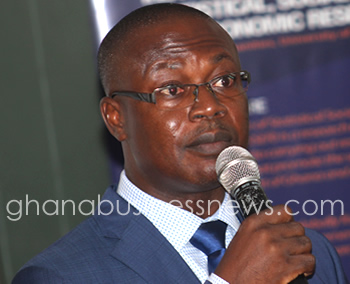Banking crisis not over yet – Economist warns
 Last week Ghana was rocked with a banking crisis – two banks otherwise thought to be doing well, the UT Bank and Capital Bank were taken over by GCB Bank because the two have become insolvent. The central bank intervened and ensured a hostile take-over of the two banks that have gone under.
Last week Ghana was rocked with a banking crisis – two banks otherwise thought to be doing well, the UT Bank and Capital Bank were taken over by GCB Bank because the two have become insolvent. The central bank intervened and ensured a hostile take-over of the two banks that have gone under.
The impact on the country has hardly died down, and an economist has warned that the crisis is not over yet, because the circumstances that led to the crisis haven’t yet been fully addressed.
Speaking to ghanabusinessnews.com in an exclusive interview Monday August 21, 2017, Dr. Charles Ackah, a Senior Research Fellow and Head of the Economics Division of the Institute of Statistical, Social and Economic Research (ISSER) of the University of Ghana, said the crisis is not over yet, because apart from the two banks, there are at least some eight banks with non-performing loans.
“The bad books are still there,” he said, adding that, “if you take four loans, one is non-performing.”
He however expressed some hope that the current government is making the right decisions with the economy to steer the country out of the conditions that led to the crisis.
The Bank of Ghana announced on August 14, 2017 in a press release that the GCB Bank has taken over UT and Capital Banks, and assured customers of the two banks that their deposits are safe.
Later at a press conference the Governor of the Bank of Ghana, Dr. Ernest Addison told journalists that there are nine banks that have been found to be capital deficient, adding that the two banks have been assisted several times but failed to stay in business. He noted that even though the two banks had submitted plans on how to address the insolvency, none of the plans could stand.
“The two were heavily deficient in capital and liquidity,” he said.
According to him, the GCB Bank will choose which assets to take and the assets that they don’t want will revert to the receiver.
He warned further that, hopefully other banks in the same situation have acted to deal with capital inadequacies.
In March this year, ISSER warned that there was a looming banking crisis in Ghana, unless the government and central bank take the right steps and decisions, following economic decline by the end of 2016.
The ratings agency, Moody’s also issued a report in February 2017, indicating that Ghana banks in addition to the problems of non-performing loans are facing high asset risks.
Moody’s pointed out that the banks are facing these risks, despite solid capital buffers, stable funding and an economic recovery expected in the country.
According to the report, the increase in problem loan levels was driven by large exposures to energy companies, for which unpaid government subsidies prevented scheduled bank loan repayments.
The ISSER also warned that the performance of the country’s monetary sector in 2016 mainly driven by a decline in inflation, slower growth of credit to the banking sector and an increased lending risk are symptoms of a struggling economy and a looming banking crisis.
While presenting the 2017 post budget analysis in Accra in March this year, Dr Ackah, noted that, 2016 ended with a Monetary Policy rate of 25.5 per cent and an inflation rate of 15.4 per cent by the end of December 2016 with the decline mainly caused by non-food factors and a relative stability in the local currency.
He said credit to the private sector in the same year also recorded slower growth resulting from the tight monetary policy recording an annual growth of 22 per cent in 2016 compared to 26.1 per cent recorded in the preceding year.
According to him, lending risk continued to surge with growth in total outstanding credit to the private sector declining from 24.9 per cent in 2015 to 17.6 per cent in 2016.
Dr. Ackah in the interview with ghanabusinessnews.com, said while he doesn’t want to sound like a ‘Prophet of Doom’ the economic conditions that existed leading to the conclusion in the report pointing to a banking crisis are still around.
“Government is still missing its targets, as spending is beyond target, and the Bank of Ghana as currently constituted can’t regulate all the banks, including the rural banks, microfinance companies and the others,” he said.
According to the Bank of Ghana, there were 33 licensed banks, two have fallen, and three more have been licensed to start operations. There are more than 500 microfinance companies, as at April 2016, there are 140 rural banks, 70 non-bank financial institutions and more than 300 forex bureaus.
Dr. Ackah asked, “for a country of 27 million people, what’s the optimal size of banks we need?”
When the Bank of Ghana was asked about the number of Banks Ghana should have, the Bank said it is an open and free economy and as many as are qualified and apply for a banking license, they will be given.
By Emmanuel K. Dogbevi
Copyright ©2017 by Creative Imaginations Publicity
All rights reserved. This news item or any portion thereof may not be reproduced or used in any manner whatsoever without the express written permission of the publisher except for the use of brief quotations in reviews.
